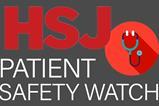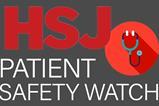HSJ hosts the Patient Safety Watch newsletter, written by Patient Safety Watch chief executive James Titcombe.
Good afternoon and welcome to the latest edition of the Patient Safety Watch newsletter.
Nurses declare corridor care a ‘national emergency’
The Royal College of Nursing has called for corridor care to become a “never event” that has to be declared in the same way as incidents such as wrong site surgery.
A survey of 11,000 of the union’s members revealed more than a third (37 per cent) had delivered care in an “inappropriate setting” during their last shift. Of those who said they had to deliver care in such a manner, more than half (53 per cent) said it meant they did not have access to life-saving equipment and around two-thirds (67 per cent) said it compromised patients’ privacy and dignity.
Nicola Ranger, acting RCN general secretary and chief executive, said: “Our once world-leading services are treating patients in car parks and store cupboards. The elderly are languishing on chairs for hours and patients are dying in corridors.
“The horror of this situation cannot be understated. It is a national emergency for patient safety and today we are raising the alarm.”
Multi-million-pound payout for teenager left brain damaged at birth
The Telegraph has reported an NHS trust has been told to pay £21.6m in compensation – one of the largest settlements awarded – to a teenager who was left brain damaged at birth after her emergency Caesarean section was delayed.
The trust involved – Chelsea and Westminster Hospital Foundation Trust – has admitted the injuries could have been avoided if appropriate care had been given at birth.
The mother of the girl – who has been kept anonymous to protect identities – told the newspaper: “It has been a long journey for my family to reach this point and I still get upset when I reflect on events in the delivery room and the way in which my concerns were dismissed.”
Hospital under fire for job advert promoting ‘normal’ birth
Readers active on social media might have noticed the storm this week following maternity campaigner Catherine Roy’s post highlighting a job advert for a “high risk” obstetrics and gynaecology consultant which listed a “desire to support and promote active and normal birth” as an essential requirement.
The focus on so-called “normal” birth in maternity services is widely regarded as having contributed to unsafe care with major inquiries highlighting the issue as a factor. Some national media outlets also picked up the post and have explored the issues in more depth.
Just the week before, a similar reaction was prompted by another maternity campaigner, Rebecca Matthews, drawing attention on X to a Green Party policy document which stated: “We will work to reduce the number of interventions in childbirth and change the culture of the NHS so that birth is treated as a normal and non-medical event, in which mothers are empowered and able to be in control.” The fallout from this is summarised well in this Guardian piece.
My view? The evidence around safe maternity care is clear, while teamwork, cooperation and positive working relationships between all maternity professionals alongside a shared vision of safe and personal maternity care are crucial. The language and ethos of “normal” birth must be consigned to the past and rigorously challenged wherever it surfaces. The strong response to these stories shows the strength of consensus in public opinion.
The job advert was rapidly removed and the Green Party moved quickly to apologise and delete the policy – but the fact both were published in the first place is concerning and demonstrates why further work to ensure culture change and learning in maternity services is so badly needed.
In other news this edition…
Children’s mental health in ‘chilling state’ as suicidal youngsters are denied help
According to The Observer, senior education figures have warned children at risk of suicide are not being referred for NHS mental health care as the services are already oversubscribed.
Centre for Young Lives founder Anne Longfield said: “Now trying to kill yourself is not enough to get mental health support. They ask: ‘Did the child really intend to end their life or not?’ That is such a chilling state to be in.”
An anonymous primary school safeguarding lead told the newspaper: “A child can say they want to end their life, but if they don’t have a definite plan they won’t be referred. Their parents are told to put all sharp objects away.”
Patient identification errors harming hundreds every year
An HSJ investigation has revealed 166 trusts logged a total of 58,537 cases of patient misidentification in Datix or other patient safety systems between 2019 and 2023. Of these, 4,713 – 943 a year on average – led to harm.
Although most of the harm recorded was categorised as “low”, HSJ found 250 cases of moderate harm, 10 cases of severe harm and two deaths across the five years.
Action against Medical Accidents chief executive Paul Whiteing described the figures as “a real cause for concern”.
An earlier Health Services Safety Investigation Body report on positive patient identification warned “patient misidentification is challenging to address and previous efforts to reduce the risk have not been as successful as hoped”.
Sharing some good stuff.
On the lookout for ICBs’ positive patient safety initiatives
Later this year, Patient Safety Watch will be publishing its latest report with Imperial College London – the National State of Patient Safety 2024. The research team is keen to feature positive case studies on how integrated care systems are approaching patient safety work. This could include work being done to understand and prioritise patient safety challenges or develop system-wide approaches to address them. The work can be in the early stages – we’d be keen to share the learning so far for the benefit of other regions. If you would like your work featured and would be willing to spare 45 minutes for a call with the research team, please email john.illingworth14@imperial.ac.uk.
Monitoring May
This newsletter has featured the fantastic work of midwives Catherine Hopley and Sarah Blackwell before. Since 2021, Catherine and Sarah have been running the Monitoring May initiative, an online event bringing together national experts and front-line professionals to share information, education and learning about fetal surveillance, listening to families and other key areas to improve maternity safety and reduce perinatal morbidity. This year’s event features many insightful sessions which have now been made available free of charge.
The power of storytelling
Many of you will know Suzette Woodward, who has made considerable contributions to patient safety thinking and improvement over many years. Dr Woodward played a key part in my own story as one of the first people I met when my journey into patient safety began some 15 years ago – her kindness, support and advice made a big difference. I loved reading this recent short blog by Suzette, which reflects on the power of storytelling in patient safety and suggests collecting stories “might help us learn differently and restart the patient safety movement”. I completely agree. Please explore this and Suzette’s other insightful blogs and her published patient safety books.
HSJ Patient Safety Awards shortlist announced
If you are looking for some inspiration, the HSJ Patient Safety Awards shortlist has been announced. Covering a wide range of pertinent categories including developing a positive safety culture, harnessing a human factors approach to patient safety, education and training, maternity and midwifery initiatives and many more, the shortlist is a great reminder of the fantastic work happening to improve patient safety across the country and a great way to share ideas for improvement more widely. It was great to see some familiar names mentioned and I look forward to seeing the winners announced at September’s HSJ Patient Safety Congress.
Last few days of early bird rate for Congress
On the subject of the HSJ Congress, book your tickets today to benefit from the discount and save up to £150 per ticket. The two-day event (16 and 17 September) will cover a rich and impressive range of key topics across 11 streams, including safety across the system, human factors, workforce wellbeing, mental health, virtual care, the patient safety incident reporting framework and leveraging AI. For more on the sessions and speakers, check out the fast-growing programme here.
Also, don’t forget to submit your poster for your chance to show you and your team’s evidence-based safety and quality initiatives to the Congress’ 1,000-plus attendees. Find out more information, download the template and submit your entries here. The deadline has been extended to 5pm on Friday 21 June.
A final share for this edition is this recent blog by the brilliant Steven Shorrock. As part of a series looking at threats to new safety movements, the blog looks at egotism and leaderism. I’ll spare you my elaborations, other than to say that some of the themes Steven writes about felt very familiar! If you’re not already aware of Steven’s work, his website and extensive writings are a fantastic resource for anyone working in the safety field.
That’s all for this edition. Please look out for our next newsletter in two weeks’ time. In the meantime, thanks for reading and stay safe.
James Titcombe































1 Readers' comment